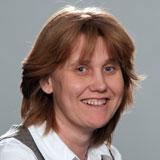
I think the most important thing that I’ve got out of being a Senior Fellow is the external recognition you receive from your peers. It gives you a profile.”Catherine Higgs
Right from the very start, it just seemed to be the right working environment for me. I enjoyed working with the students and developing their knowledge, so I never looked to go back out into the industry even when the recession finished and the boom returned. I’ve found that delivering work-based learning modules has enabled me to stay updated and maintain my links with industry.
Although the university provided a training course to help me in terms of my lecturing skills, there was absolutely no formal teaching accreditation scheme when I started out. I was one of those people who had been in education a long time, but who never received any formal recognition of their skill sets. That’s why I wanted to become a Fellow.
The only problem when it came to applying seemed to be time, or rather a lack of it. All my colleagues were getting involved (with Advance HE) and I felt I wanted that recognition as well, so I went on a writing retreat in Cardiff and built up a better understanding of what was required of Senior Fellowship and Fellowship, and felt I was more of a Senior Fellow. I also wrote two case studies for the application and a plan for the reflection. However, being a lecturer who at the time was also involved in management that was all the progress I made in two years.
I think the hardest part to it, apart from finding the time, was providing the evidence. It’s being able to quantify and articulate what kind of an impact you’ve had and what you have achieved.
I had published videos on YouTube about quantity surveying measuring and when I was preparing for Senior Fellowship I had a look to see how many hits I’d got…..and I had 71,000! Listening to myself on video really helped because it made me look at how I communicate. That kind of self-assessment made a big difference in supporting my application.
I think the most important thing that I’ve got out of being a Senior Fellow is the external recognition you receive from your peers. It gives you a profile. What’s interesting is that people ask me for advice in terms of teaching and learning. People know you are interested in pedagogy and will help support them. If you asked many of my peers what my specialist area is, I think just as many people would say the art of teaching as quantity surveying practice. That’s something which I’m immensely proud of.
Are you an individual able to provide evidence of a sustained record of effectiveness in relation to teaching and learning, incorporating for example, the organisation, leadership and/or management of specific aspects of teaching and learning provision? Senior Fellowship could be for you. Find out more.